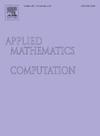基于采样数据的Lurie系统稳定性与镇定
IF 3.4
2区 数学
Q1 MATHEMATICS, APPLIED
引用次数: 0
摘要
讨论了Lurie系统的采样数据控制问题。首先,给出了在给定控制器增益的情况下保证系统稳定的充分条件。然后将这个条件扩展到设计一个状态反馈控制器(SFC)来稳定系统。此外,本文还介绍了一种圆锥互补线性化迭代(CCLI)算法,该算法具有增强的迭代条件来获得控制器增益。数值算例表明,所提方法优于已有的文献方法。本文章由计算机程序翻译,如有差异,请以英文原文为准。
Sampled-data-based stability and stabilization of Lurie systems
This paper discusses the sampled-data control problem of Lurie systems. First, a sufficient condition is presented to ensure system stability with a predefined controller gain. This condition is then extended to design a state-feedback controller (SFC) that stabilizes the systems. Additionally, the paper introduces a cone complementary linearization iteration (CCLI) algorithm with an enhanced iteration condition to obtain the controller gain. Numerical examples demonstrate that the proposed method surpasses existing methods in the literature.
求助全文
通过发布文献求助,成功后即可免费获取论文全文。
去求助
来源期刊
CiteScore
7.90
自引率
10.00%
发文量
755
审稿时长
36 days
期刊介绍:
Applied Mathematics and Computation addresses work at the interface between applied mathematics, numerical computation, and applications of systems – oriented ideas to the physical, biological, social, and behavioral sciences, and emphasizes papers of a computational nature focusing on new algorithms, their analysis and numerical results.
In addition to presenting research papers, Applied Mathematics and Computation publishes review articles and single–topics issues.

 求助内容:
求助内容: 应助结果提醒方式:
应助结果提醒方式:


